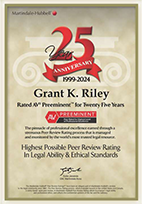
Legionnaires’ disease presents as a severe form of pneumonia. Caused by infection from Legionella bacterium, Legionnaires’ disease, and Pontiac fever spread through water droplets in the air. Legionella bacteria grow in warm, stagnant water and can be found in cooling towers for air conditioning in large buildings. Consequently, one study reported that 20% of Legionnaires’ cases between 1980 and 1998 were travel-associated.
If you believe that you or a loved one encountered Legionella from air conditioning in a hotel, resort, casino, or apartment building, Riley | Ersoff is here to help. Riley | Ersoff partner and attorney Victoria L. Ersoff has handled over 2,000 Legionnaires’ claims across the US and in California. She has the experience and skill to hold building owners, even large corporations, responsible for Legionnaires’ disease from an air conditioner used in public places.
Where Might Air Conditioning Contain Legionella?
For Legionella to be in air conditioning, the system must use water as a coolant. Cooling towers, commonly found in large buildings, are often sources of Legionella in air conditioning. These towers cool air by removing heat using an open basin of water and fans. These fans can spray water containing Legionella into the air if not properly maintained. Certain types of buildings are more likely to have cooling towers, especially:
- Hospitals,
- Hotels,
- Schools,
- High-rise apartment buildings,
- Multi-story office buildings, and
- Buildings housing commercial or industrial processes.
Once the contaminated water droplets enter an air conditioning system, they can spread throughout the building. Infection can occur when you breathe in the droplets. It is rare for a person-to-person transmission to occur.
Can I Get Legionnaires’ Disease from Home Air Conditioning?
You are not likely to get Legionnaires’ disease from your home’s air conditioning. Typically, home air conditioning units cool the air using halogenated chlorofluorocarbons (HCFCs) rather than water. Because Legionella needs water to grow, the air conditioning in your house is not likely to produce and spread infectious bacteria. You can check what type of refrigerant your unit uses by looking at the nameplate on the AC unit.
Can I Get Legionnaires’ Disease from Window Air Conditioning?
Similarly, you are not likely to get Legionnaires’ disease from window air conditioning units because they do not use water as a refrigerant. In addition, window air conditioning units are a “self-contained” system and do not use ducts to transfer the air. Likewise, car air conditioning is not likely to produce Legionella since it does not use standing water for cooling.
Who Is Responsible for Preventing Legionnaires’ in Air Conditioning?
Under California’s premise liability law, an owner or occupant is responsible for an injury caused by “his or her want of ordinary care or skill in the management of his or her property.” A person who occupies, leases, owns, or controls property is expected to use reasonable care to maintain the property in a reasonably safe condition. A person is negligent in the maintenance of the property if:
- A condition on the property created an unreasonable risk of harm;
- The owner knew or should have known about the risk; and
- The owner failed to repair the condition, protect against harm from the condition, or give adequate warning of the condition.
The CDC has created guidelinesfor hotel and property owners to maintain their cooling towers. Although evidence that they did not follow CDC guidelines does not conclusively prove negligence, a jury may consider the practice when determining responsibility.
Do I Need a Lawyer if I Contracted Legionnaires’ Disease from an Air Conditioner?
A Legionnaires’ disease lawyer is knowledgeable and has resources to help you put together a successful claim. To receive compensation for your illness, you must be able to prove that a property owner had a responsibility to maintain safe premises, that they failed to do so, that this failure caused you to come into contact with Legionella bacteria, and that contact resulted in you contracting Legionnaires’ disease. Only your attorney can determine the value of your case. While you should keep documentation of your economic damages like medical bills and lost wages, your attorney can help quantify your non-economic damages such as pain and suffering. Also, your attorney can help with collecting and preserving evidence, researching the premises owner’s maintenance records, and creating a timeline of your symptoms. At Riley | Ersoff, we’ve narrowed our practice exclusively to handling lawsuits for Legionnaires’ disease, lead poisoning, slum housing, and carbon monoxide poisoning. We have a record of success in helping people get the compensation they deserve when injured due to dangerous property conditions. Riley | Ersoff LLP’s detailed knowledge of the cause and effect of Legionnaires’ disease and their experience in successfully litigating these extremely complex cases is unmatched. Contact us today to set up a consultation for your Legionnaires’ disease lawsuit.
The post Can I Get Legionnaires’ Disease from Air Conditioning? appeared first on Riley | Ersoff LLP.

















